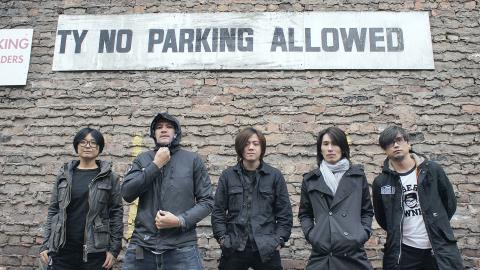Taiwan is fairly bursting with music festivals these days, and now Taipei gets another one. Spring Wave has been going since 2006 as the Mando-pop festival in Kending, where it serves as a mainstream counterpart to Asia’s oldest continuous rock festival, Spring Scream.
This weekend, Spring Wave opens its first franchise event in Taipei in the riverside park on the south bank of the Keelung River. Never mind that it’s autumn — the event is still called Spring Wave, just as the music is still Mando-pop.
The lineup is one you might see on a TV variety show, with Warner Music artist JJ Lin (林俊傑) headlining tonight and female idol Hebe Tien (田馥甄) topping tomorrow’s bill. Other performers include Bii (畢書盡), the Taiwanese pretty boy with a Korean mom, Della Ding (丁噹),a Chinese singer who forged her career in Taiwan, the busty Kuo Shu-yao (郭書瑤, aka Yaoyao), the Singaporean duo of sexy twins By2, rock bands Chairmen (董事長) and Monkey Pilot, TV show host and singer Tao Ching-ying (陶晶瑩), and indie-pop artist Ann (白安).

Photo Courtesy of Friendly Dog Entertainment
The concert is really more interesting as a marker of shifting business trends than for its singers. Since the 1990s, Taiwan has been the music factory of Chinese pop, but physical music sales have crumbled in the last decade with the rise of the Internet. Aside from licensing and endorsements, concerts and events are one of the music industry’s last bastions for earning revenues.
Now some in the music industry are trying to expand pop’s market into music festivals. Spring Wave will compete mainly against the Simple Life Festival, which is set to take place in Taipei at the beginning of December. Both events are produced by former top staff at Rock Records (滾石唱片), one of Asia’s music majors in the 1990s — Spring Wave by former music director Shen Kwan-yuan (沈光遠) and Simple Life by marketing guru Landy Chang (張培仁).
Yet festivals for Mando-pop have been slow to appear — much slower than festivals for rock, which has spawned numerous competing events in Taiwan since the mid 1990s. One big reason may be that pop music becomes uncomfortable outside of the sterile studio atmosphere, and its fans are likewise put off by festivals’ free-flowing socializing and the various discomforts — standing (or even sitting) for hours, no air conditioning, portable toilets and the threat of rain. These were all criticisms of recent pop festivals in Singapore, where such events are quite new.

Photo Courtesy of Friendly Dog Entertainment
Taiwanese fans are perhaps much hardier, and have been weaned on all sorts of festivals since the late 1990s.
At present, it would be safe to say that Taiwan’s festival market is fairly saturated. Other music festivals taking place this year in or near Taipei include Ho-Hai-Yan Gongliao Rock Festival (貢寮國際海洋音樂), Urban Simple Life Festival (簡單生活節), Spring Wave Music and Art Festival (墾丁春浪音樂節), Daniel Pearl Day, Beastie Rock Festival (巨獸搖滾音樂祭) and Street Voice Park Carnival. Elsewhere in Taiwan, we’ve seen Spring Scream, Spring Wave Kending, the Heart Town Festival, Rock in Taichung and the Wake Up Festival in Chiayi. There are also half a dozen big dance music parties with festival-sized attendance. And two of Taiwan’s biggest music festivals — Formoz and Megaport — weren’t even held this year, though they may re-appear in 2015.
With no room left to grow at home, the big players are looking to grow in overseas markets, namely Hong Kong, China and Singapore.

Photo Courtesy of Friendly Dog Entertainment
Music festival exports started in earnest in 2011, and their sudden appearance in Hong Kong that year was enough that the local version of Time Out couldn’t help but ask, “Does anyone else think that Taiwan is trying to invade our music scene?” The first Hong Kong incursions were an indie upstart event called Taiwan Calling (held annually until 2013) and the Ho-Hai-Yan (held only once with major Taiwanese government support). This year, the Heart Town Festival, a new metal fest organized from Greater Taichung, chose to launch simultaneously in Taiwan and Hong Kong.
Those events saw mixed success.
But both Simple Life and Spring Wave are showing much bigger promise. Last weekend, Simple Life drew 60,000 individual visits to a three-day festival in Shanghai. Spring Wave has been active in Hong Kong and Singapore since 2013, drawing sizable crowds for single-day events in both cities.

Photo Courtesy of Friendly Dog Entertainment
Last year, the initial Spring Wave Singapore drew 5,400 and was called Singapore’s first ever outdoor music festival for Chinese pop. This June, the second Singapore edition drew over 4,000, according to media reports.
In Hong Kong, Spring Wave fared even better last year, with the inaugural event attracting over 10,000 to a new fair grounds in Kowloon. But this year’s event, scheduled to take place in Hong Kong at the end of August, was cancelled. Organizers stated a mix of political concerns — a democracy protest at the beginning of July saw hundreds of thousands of Hong Kongers take to the streets — and tragic events in Taiwan, including the Greater Kaohsiung gas explosion and the Jinmen plane crash. These reasons were listed in an official statement, which declared that “these elements have all affected the current social atmosphere in Hong Kong and Taiwan.”
Looking at what’s happening in Hong Kong now, Spring Wave probably made the right decision. Also, it still has Taipei this weekend, which will be its third major festival in 2014.

Photo Courtesy of Friendly Dog Entertainment
In the bigger picture, festivals may be a new way to keep Taiwan running the factory of Mando-pop.
■ Spring Wave takes place today and tomorrow from 4pm to 11pm in Taipei’s Dajia Riverside Park (大佳河濱公園). Tickets are NT$1,200 to NT$2,900 through 7-Eleven iBon.

On April 26, The Lancet published a letter from two doctors at Taichung-based China Medical University Hospital (CMUH) warning that “Taiwan’s Health Care System is on the Brink of Collapse.” The authors said that “Years of policy inaction and mismanagement of resources have led to the National Health Insurance system operating under unsustainable conditions.” The pushback was immediate. Errors in the paper were quickly identified and publicized, to discredit the authors (the hospital apologized). CNA reported that CMUH said the letter described Taiwan in 2021 as having 62 nurses per 10,000 people, when the correct number was 78 nurses per 10,000

As we live longer, our risk of cognitive impairment is increasing. How can we delay the onset of symptoms? Do we have to give up every indulgence or can small changes make a difference? We asked neurologists for tips on how to keep our brains healthy for life. TAKE CARE OF YOUR HEALTH “All of the sensible things that apply to bodily health apply to brain health,” says Suzanne O’Sullivan, a consultant in neurology at the National Hospital for Neurology and Neurosurgery in London, and the author of The Age of Diagnosis. “When you’re 20, you can get away with absolute

May 5 to May 11 What started out as friction between Taiwanese students at Taichung First High School and a Japanese head cook escalated dramatically over the first two weeks of May 1927. It began on April 30 when the cook’s wife knew that lotus starch used in that night’s dinner had rat feces in it, but failed to inform staff until the meal was already prepared. The students believed that her silence was intentional, and filed a complaint. The school’s Japanese administrators sided with the cook’s family, dismissing the students as troublemakers and clamping down on their freedoms — with

As Donald Trump’s executive order in March led to the shuttering of Voice of America (VOA) — the global broadcaster whose roots date back to the fight against Nazi propaganda — he quickly attracted support from figures not used to aligning themselves with any US administration. Trump had ordered the US Agency for Global Media, the federal agency that funds VOA and other groups promoting independent journalism overseas, to be “eliminated to the maximum extent consistent with applicable law.” The decision suddenly halted programming in 49 languages to more than 425 million people. In Moscow, Margarita Simonyan, the hardline editor-in-chief of the